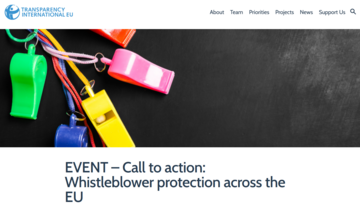Civil society, including anti-corruption and transparency NGOs, trade unions, journalist associations, and academics were instrumental in calling for legal protections and ensuring the Directive set out a strong foundation to protect the right to speak out against wrongdoing and harm.
Whistleblowing is essential to protecting the public interest – whether it is reporting the corruption that results in sub-standard PPE equipment for front-line workers during COVID-19, or revealing systematic non-compliance with environmental or other safety standards which pollutes the air we breathe, the food we eat or the water we drink. Whistleblowers help responsible businesses learn about problems before the damage is done and help hold irresponsible organisations to account for their wrongdoing or negligence.
Transparency International invites to the event: Transposition 2021, a race against time
When: 23 February, 14:00 – 15:30 (CET).
Here more details.
Tags: Whistleblowing European policies and legislation EU Member States
This content is part of the Media Freedom Rapid Response (MFRR), a Europe-wide mechanism which tracks, monitors and responds to violations of press and media freedom in EU Member States and Candidate Countries. The project is co-funded by the European Commission.



